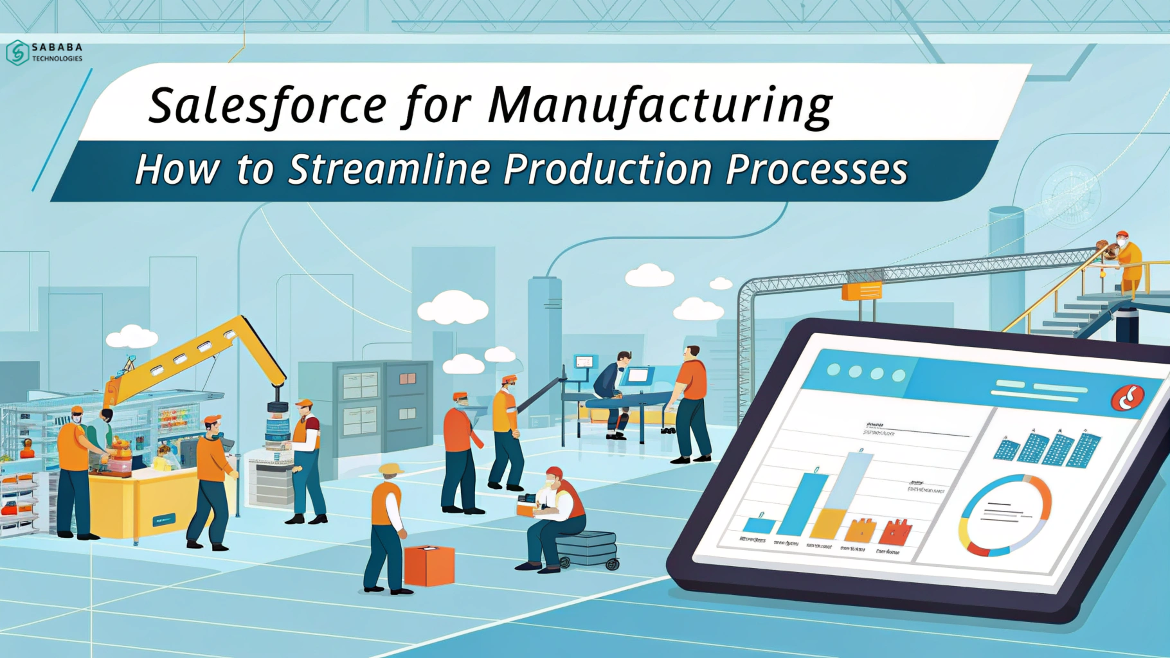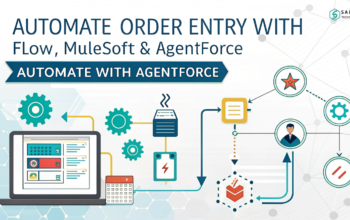Boost efficiency with Salesforce Manufacturing Cloud—streamline production management and gain real-time supply chain insights.
A New Era for Manufacturing
Let’s face it—manufacturing today isn’t what it used to be. The days of managing spreadsheets, juggling outdated ERPs, and reacting to production issues after they arise are over. Modern manufacturers need visibility, agility, and precision. This is where Salesforce Manufacturing Cloud enters the picture—offering a smarter, sharper way to streamline production processes.
In this guide, we’ll unpack how Salesforce for manufacturing transforms your factory floor, redefines production planning, and brings sales and operations onto the same page.
Why Traditional Systems Hold You Back
Before we jump into solutions, let’s talk about friction. Most manufacturing companies still deal with fragmented systems. Sales forecasts rarely sync with production. Inventory reports are outdated by the time they’re printed. Meanwhile, customer demand shifts in real time.
That disconnect can cost you. Not just in dollars—but in lost trust, missed opportunities, and operational chaos. Manufacturers need something more dynamic. They need a cloud-based solution that evolves with them.
Enter Salesforce Manufacturing Cloud
Salesforce Manufacturing Cloud is purpose-built for the manufacturing industry. It acts as a digital bridge between your front-end sales and back-end production teams. Unlike generic CRMs, this cloud platform understands the nuances of production cycles, partner ecosystems, and order complexities.
With Salesforce for manufacturing, you get full visibility—from forecasted orders to production schedules, from customer accounts to supply chain fluctuations.
Key Features That Streamline Production
Let’s break down how Salesforce sharpens your production management:
1. Sales Agreement Visibility
Sales reps often close deals without visibility into inventory or production constraints. That’s a recipe for overpromising. With the Manufacturing Cloud, agreements are transparent. Production managers can plan better, reducing waste and backlogs.
2. Forecast Accuracy in Real Time
Old-school forecasts age quickly. Salesforce uses AI and real-time data to predict customer demand accurately. It aligns your production capacity with actual market needs—not guesses.
3. Integrated Order Management
Managing orders across multiple channels? Salesforce centralizes them. This ensures production teams receive clean, consistent input—every time. No more chasing down emails or spreadsheets.
4. 360° Customer View
Knowing your customer isn’t just for sales—it’s essential for production. When your shop floor knows why a specific delivery matters, they handle it with greater care. Salesforce unifies sales, service, and order data in one dashboard.
5. Collaboration Made Easy
Manufacturing involves multiple players—engineering, procurement, sales, shipping. Salesforce provides a single source of truth. Internal teams and external partners stay in sync with chatter, workflows, and real-time updates.
Real-World Application: A Manufacturer’s Journey
Consider a mid-sized automotive parts supplier. Before implementing Salesforce, they primarily operated using Excel sheets, scattered emails, and disconnected planning tools. As a result, forecasts were only made quarterly, and whenever a change request came in, it often caused chaos on the production line.
After implementing Salesforce Manufacturing Cloud, everything changed. Forecasts updated daily. Customer preferences fed directly into product planning. Even the procurement team synced their schedules with supplier portals via Salesforce.
The result? Reduced production delays by 37%, customer satisfaction climbed, and decision-making became data-driven, not intuition-based.
Salesforce Tools That Matter Most to Manufacturers
Here’s what your tech stack could look like:
- Salesforce Manufacturing Cloud – for contract management, forecasting, and real-time visibility
- Salesforce CPQ – for accurate quotes that sync with production feasibility
- Service Cloud – to manage post-sale product support and warranty cases
- Tableau CRM – for advanced production analytics and performance tracking
- Slack Integration – for real-time collaboration across plants and departments
Each tool plays a unique role in tightening your production pipeline.
The Ripple Effects on Your Supply Chain
When you streamline production, it impacts more than just the factory floor. Your supply chain benefits too. With Salesforce:
- Procurement becomes proactive, not reactive.
- Logistics teams plan smarter routes based on demand signals.
- Vendors receive early insights, reducing lead time surprises.
- Customer support handles fewer complaints due to better fulfillment rates.
In short, it creates a cascading improvement across the board.
Challenges to Watch (and How to Overcome Them)
No transformation comes without hurdles. You might face:
- Resistance to change from staff used to legacy systems
- Integration complexity with existing ERPs or MES platforms
- Data migration risks, especially from outdated tools
But here’s the upside—Salesforce has a wide partner ecosystem. Whether you need implementation support, system integration, or industry-specific consultation, help is just around the corner.
Start small. Choose a pilot production line. Then scale gradually.
Ready to Manufacture Smart?
Manufacturing is undergoing a quiet revolution—and those who embrace tools like Salesforce Manufacturing Cloud are already ahead. It’s not about replacing humans; it’s about empowering them with better information and faster collaboration.
So if you’re tired of reactive production planning, disconnected systems, and missed margins, now’s the time to act. Let Salesforce do the heavy lifting so your team can focus on what they do best—building world-class products.
Final Thoughts
In a world where customer expectations are rising and margins are steadily shrinking, Salesforce for manufacturing clearly offers a strategic advantage. Not only does it support production management, but it also enhances supply chain coordination. As a result, its tools bring greater visibility, tighter control, and stronger alignment across the board. Therefore, by adopting Salesforce now, you can start streamlining your production today—and, more importantly, future-proof your operations for tomorrow.
FAQs
1. What is Salesforce Manufacturing Cloud used for?
It’s a Salesforce solution designed specifically for manufacturers to manage sales agreements, production forecasts, and supply chain visibility.
2. Can Salesforce integrate with ERP systems in manufacturing?
Yes, Salesforce can integrate with most ERP platforms using APIs, middleware, or pre-built connectors.
3. Is Manufacturing Cloud suitable for small manufacturers?
Absolutely. Its modular approach allows smaller firms to start with core features and scale up.
4. How does Salesforce improve production accuracy?
By syncing forecasts with real-time demand, eliminating manual errors, and automating workflows.
5. What’s the ROI of using Salesforce in manufacturing?
Companies report increased forecast accuracy, reduced production delays, and better customer satisfaction—often seeing ROI within the first year.
Feeling more like puzzles than solutions? That’s when Sababa steps in.
At Sababa Technologies, we’re not just consultants, we’re your tech-savvy sidekicks. Whether you’re wrestling with CRM chaos, dreaming of seamless automations, or just need a friendly expert to point you in the right direction… we’ve got your back.
Let’s turn your moments into “Aha, that’s genius!”
Chat with our team or shoot us a note at support@sababatechnologies.com. No robots, no jargon, No sales pitches —just real humans, smart solutions and high-fives.
P.S. First coffee’s on us if you mention this blog post!



